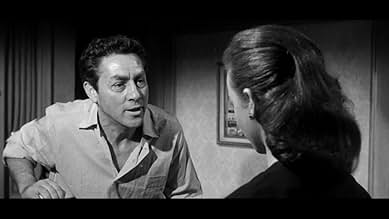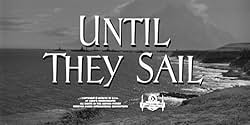IMDb RATING
6.5/10
1.8K
YOUR RATING
During WWII, unmarried New Zealand women meet and marry American soldiers who are fighting in the Pacific theater.During WWII, unmarried New Zealand women meet and marry American soldiers who are fighting in the Pacific theater.During WWII, unmarried New Zealand women meet and marry American soldiers who are fighting in the Pacific theater.
- Awards
- 1 win total
Patrick Macnee
- Pvt. Duff
- (scenes deleted)
Mary Ellen Batten
- Brunette
- (uncredited)
Nicky Blair
- US Marine
- (uncredited)
William Boyett
- US Marine
- (uncredited)
Roy Clark
- Marine at Dance
- (uncredited)
- Director
- Writers
- All cast & crew
- Production, box office & more at IMDbPro
6.51.8K
1
2
3
4
5
6
7
8
9
10
Featured reviews
This is what I spend the night withand no regrets . . . And nobody gets hurt.
Very good Paul Newman about the effect that war has on people's lives as they try to cope with their loneliness due to separation.
It was a great ensemble cast with Newman and Jean Simmons (Oscar nominations for The Happy Ending and Hamlet), Joan Fontaine (Oscar for Suspicion, and nominations for Rebecca and The Constant Nymph), Piper Laurie (Oscar nominations for Carrie, Children of a Lesser God, The Hustler), and Sandra Dee.
For a 1957 film, it really took on issues such as infidelity and illegitimate children and the casualness of sex during wartime.
Newman was great as the officer charged with investigating girls who soldiers wanted to marry and take back home. He played a character very familiar in his films - one that had a close relationship with the bottle.
It was a great ensemble cast with Newman and Jean Simmons (Oscar nominations for The Happy Ending and Hamlet), Joan Fontaine (Oscar for Suspicion, and nominations for Rebecca and The Constant Nymph), Piper Laurie (Oscar nominations for Carrie, Children of a Lesser God, The Hustler), and Sandra Dee.
For a 1957 film, it really took on issues such as infidelity and illegitimate children and the casualness of sex during wartime.
Newman was great as the officer charged with investigating girls who soldiers wanted to marry and take back home. He played a character very familiar in his films - one that had a close relationship with the bottle.
Jean Simmons at her most enchanting.
To start with this is a film about New Zealand women but NOT a New Zealand film.Some viewers are not aware that the N.Z.
backdrops are actually filmed by the second unit while the close-ups and interiors were filmed in the M.G.M.studio.I was 11
when this film was released here and already obsessed with films and film stars.I later understood why my parents steered
me away from "Until They Sail" not only because of the adult content but also because it was only about 12 years after WW11
and even adults refrained from discussing the American "contribution" to our society.Many of my generation were adopted
out and did not discover until years later that they their fathers were actually visiting American servicemen.
Back to the film itself while it's not totally convincing to us Kiwis it is a worthy effort in it's own right.The acting is impressive
particularly from the underrated Jean Simmons who is absolutely drop-dead gorgeous and teams superbly with Paul Newman.
Taking wanted love
A good deal made me want to see 'Until They Sail'. A fine director in Robert Wise, who directed two of my favourite films ('West Side Story' and 'The Sound of Music', is that going to be a popular opinion here?), a cast full of great actors (Paul Newman, Jean Simmons, Joan Fontaine), some interesting themes, my love for classic film and an equally interesting idea for a story.
While it was not mind-blowing or perfect, neither will it be one of my favourites any time soon, 'Until They Sail' was still a well done film with many great things, that had emotional impact, was brave in how it portrayed its themes, made the most out of its story and far from wasted its talent. Not the best work of all involved but all come off well. More one of those appreciated it rather than loved it ones.
'Until They Sail' is a little overwrought at times as could have done with a little less talk.
Also found the outcome of the Piper Laurie and Wally Cassell subplot forced and a jarring note in a film that otherwise was anything but. The odd pacing lull here and there, but a vast majority of the time the pace is measured but seldom dull.
However, there is nothing to fault the cast. Fontaine and Simmons give sensitive, deeply felt performances and Newman's is one of his better ones of his early career, comfortable and intensely cool. Piper Laurie's accent may stick out somewhat but her acting is committed and rich in emotion, while Sandra Dee is more than credible. Wise directs superbly.
Visually, 'Until They Sail' is beautifully and cleverly shot with some striking and vivid locations. The script is thought-provoking and remarkably daring in its sophistication-filled and not over-serious handling of themes seldom explored in film at this point, giving it much humanity. The story is mostly sympathetic and poignant, avoiding getting too over the top in melodrama, not easy to do with the subject and topics explored. The characters are realistically written.
In conclusion, well done and interesting, with few stumbling blocks and many great things. 7/10 Bethany Cox
While it was not mind-blowing or perfect, neither will it be one of my favourites any time soon, 'Until They Sail' was still a well done film with many great things, that had emotional impact, was brave in how it portrayed its themes, made the most out of its story and far from wasted its talent. Not the best work of all involved but all come off well. More one of those appreciated it rather than loved it ones.
'Until They Sail' is a little overwrought at times as could have done with a little less talk.
Also found the outcome of the Piper Laurie and Wally Cassell subplot forced and a jarring note in a film that otherwise was anything but. The odd pacing lull here and there, but a vast majority of the time the pace is measured but seldom dull.
However, there is nothing to fault the cast. Fontaine and Simmons give sensitive, deeply felt performances and Newman's is one of his better ones of his early career, comfortable and intensely cool. Piper Laurie's accent may stick out somewhat but her acting is committed and rich in emotion, while Sandra Dee is more than credible. Wise directs superbly.
Visually, 'Until They Sail' is beautifully and cleverly shot with some striking and vivid locations. The script is thought-provoking and remarkably daring in its sophistication-filled and not over-serious handling of themes seldom explored in film at this point, giving it much humanity. The story is mostly sympathetic and poignant, avoiding getting too over the top in melodrama, not easy to do with the subject and topics explored. The characters are realistically written.
In conclusion, well done and interesting, with few stumbling blocks and many great things. 7/10 Bethany Cox
Great Romantic Story
This film was written by famous writer James Michener and also a very famous director Robert Wise along with a great cast of actors who made this into a great 1957 Classic to view and enjoy. The story revolves around sister's who live in New Zealand during the war and most of the men have gone into the service of their country and left a small town without any men and strictly women. As the war continues, these women seek men and when the United States troops arrive in New Zealand many women want to get married, some have babies out of wedlock and the war upsets the morals of all men and women in this small town. Jean Simmons, (Barbara Leslie Forbes); Joan Fontaine Anne Leslie and Sandra Dee, (Evelyn Leslie) are all sisters, some married and some simply living with one man after another. Sanda Dee plays the role of the baby sister in her teens who also begins to fall in love. Paul Newman, (Capt. Richard Bates) has a great interest in Barbara Leslie after her husband is killed, but he will not commit himself to her and is really afraid to start a relationship because he has to fight in the Pacific against the Japanese Government. This is a very emotional film and shows the horrors of war and the suffering it causes men and women. Enjoy.
Touching, inusual and sprawling war movie
As I wrote in the summary, this is NOT your typical war movie full of action and battles with fire-arms scenes; so, if you want to see something similar to THE LONGEST DAY or BATTLE OF BRITAIN, this movie it's not for you!
Now I am not saying that UNTIL THEY SAIL it's bad. I am saying that this movie, instead of focusing on the war actions, it focuses on the women left behind waiting their husbands from the war and their woes and all the differences between them. And, even though it's not a must-see movie, it's actually pretty good.
Visually, this movie is beautifully shot, and the locations (in New Zealand) are simply a delight to watch; the soundtrack, even though it's not outstanding, it's also pretty good. And the pace, although it dragged half-way, it's measured.
The performances are all good: Paul Newman (in one of his first movies) it's charismatic and cool as always; Joan Fontaine, Piper Laurie and Sandra Dee are credible and give heart-felt performances, and Jean Simmons, like Newman, gives a deep and touching performance. And it's directed by Robert Wise, another great director of the 1950s-1960s.
The story is very realistic and never gets over the top despite the setting and subject explored. In substance, even with a few flaws, it's well done and worth-watching.
Now I am not saying that UNTIL THEY SAIL it's bad. I am saying that this movie, instead of focusing on the war actions, it focuses on the women left behind waiting their husbands from the war and their woes and all the differences between them. And, even though it's not a must-see movie, it's actually pretty good.
Visually, this movie is beautifully shot, and the locations (in New Zealand) are simply a delight to watch; the soundtrack, even though it's not outstanding, it's also pretty good. And the pace, although it dragged half-way, it's measured.
The performances are all good: Paul Newman (in one of his first movies) it's charismatic and cool as always; Joan Fontaine, Piper Laurie and Sandra Dee are credible and give heart-felt performances, and Jean Simmons, like Newman, gives a deep and touching performance. And it's directed by Robert Wise, another great director of the 1950s-1960s.
The story is very realistic and never gets over the top despite the setting and subject explored. In substance, even with a few flaws, it's well done and worth-watching.
Did you know
- TriviaSandra Dee's debut ("Evelyn Leslie") But, the 1957 Soviet animated feature The Snow Queen (1957) is often listed as Dee's first film credit, because she and other Hollywood stars did the voices for the English-language version, but that English-language audio was not actually made until 1959.
- GoofsAt the start of the film, set in 1939, the four sisters put up a map of the world to keep track of the soldiers' locations, but the map is contemporary from the year the film was made (1957), showing numerous nations that did not exist in 1939, for example: Laos, Cambodia and Vietnam (which would have been French Indochina in 1939), Indonesia (formerly the Dutch East Indies), Thailand (called Siam in 1939), and Pakistan (which was part of British India), among other countries.
- Quotes
Barbara Leslie Forbes: [Last lines] If my father could read the history of his daughters...
Capt. Jack Harding: He'd understand.
Barbara Leslie Forbes: As they say, to understand is to forgive. Or is it, to understand is not to forgive? I can never remember.
- ConnectionsReferences Mutiny on the Bounty (1935)
Details
Box office
- Budget
- $1,841,000 (estimated)
- Runtime
- 1h 34m(94 min)
- Color
- Sound mix
- Aspect ratio
- 2.35 : 1
Contribute to this page
Suggest an edit or add missing content






































